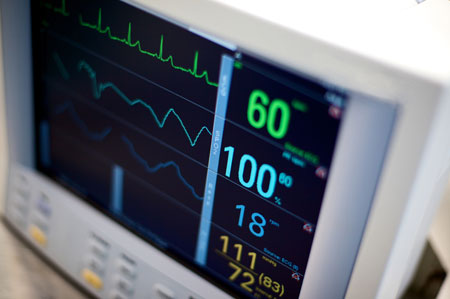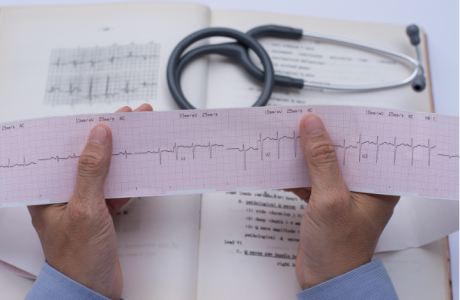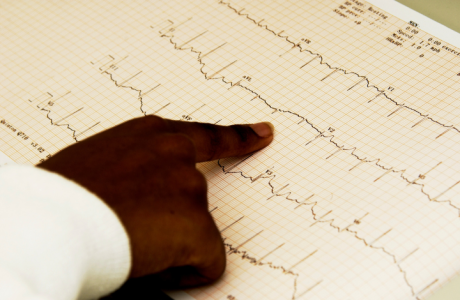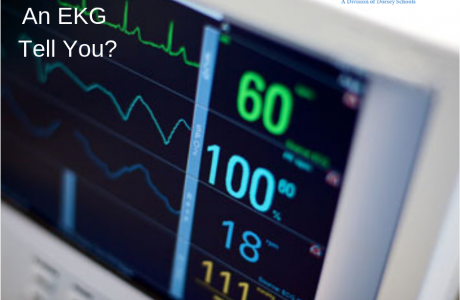We continue our series on Heart Health (during Heart Health month this February) today when we talk about Electrocardiograms (EKGs). You may have heard about EKGs before, but wondered, what the heck is that test? We’re going to break down some of the basics for you today.
What is an EKG?

An Electrocardiogram (EKG or ECG) is a test that checks for problems with the electrical activity with a person’s heart. An EKG shows tracings on paper and those tracings represent the electrical activity of the heart. You may be wondering “electrical activity of the heart” what does that mean?! Well, think of the heart as a pump, it’s a muscular pump that consists of four chambers. The two upper chambers of the heart are atria and the two lower chambers of the heart are called ventricles. There is a natural electrical system within the heart that makes it contract and each time it contracts, blood pumps through the heart, the lungs, and throughout the rest of the body.
Why do people have EKGs?
As previously mentioned, an EKG is a test that measures heart health. It may be ordered for a patient by a healthcare professional for a number of reasons, including (but not limited to):
- Checking the electrical activity of the heart
- Trying to understand the cause of chest pain or pressure (which sometimes may be caused by a heart attack or angina)
- Identify the cause of symptoms of heart disease
- See if the walls of the heart are too thick
- See how medications are currently working and try to identify if they are affecting the heart
- See how medical devices (such as pacemakers) are working
- Check the general health of the heart when other diseases or conditions may be present (such as high blood pressure, high cholesterol, smoking, diabetes, a family history of heart disease, etc.).
What happens during and after an EKG?
Having any medical test or procedure can be a scary thing to think about at first, even if it’s routine or precautionary. It’s important to understand what to expect both during and after the test/procedure and that can often help set your mind at ease.
In total, an EKG will only take 5-10 minutes on average. Here’s what you can expect during an EKG:
- Patients will be asked to lie on a table or a bed.
- Certain areas of the patient’s body (arms, legs, and chest) where the electrodes will be placed will be cleaned (and possibly shaved).
- The healthcare professional facilitating the test will place electrodes on the patient’s body (as previously noted, on the patient’s arms, legs, and chest). The electrodes measure the electrical activity of the heart. The electrical activity is recorded as traces on paper from the test.
- During the test, the healthcare professional administering the test may ask the patient not to talk, lie very still, and breathe normally. Sometimes patients may also be asked to hold their breath during the test.
- After the test, the electrodes are removed from the patient and the electrode paste is wiped off the patient.
At the conclusion of the EKG, a doctor will read and interpret the patient’s results from the test. In reading the test, the doctor will look at the pattern of spikes and dips (from the traces on the paper) to check the electrical activity from different areas of the heart. The spikes and dips are grouped in sections to show how the heart is working.
We’ve included a helpful chart here from our friends at WebMD that explains how the results of an EKG are interpreted.
About Training Direct
Since being founded in 1990, Training Direct has been committed to its mission of offering quality hands-on training and education designed to lead towards entry-level employment opportunities for those who wish to pursue a career in the healthcare field. Furthermore, Training Direct is committed to offering the men and women of Connecticut quality vocational training to prepare them for new careers in healthcare. Over the years, Training Direct has helped train thousands of successful graduates who have gone on to enjoy careers as Certified Nurse Aides, Medical Billing and Coding Specialists, and Phlebotomy Technicians in the Medical field.
Training Direct operates two campuses in Connecticut:
While specific training programs will vary by campus, Training Direct offers the following:
- Nurse Aide
- Phlebotomy Technician
- Medical Billing and Coding Specialist
- Patient Care Technician
- EKG Technician
- Electronic Medical Records
Training Direct is a Division of Dorsey Schools.
About Dorsey Schools
Dorsey Schools are postsecondary institutions that provide short term comprehensive training to prepare students for promising career opportunities in various fields. Dorsey offers cosmetology training, culinary arts training, skilled trades training, and medical training programs for various allied health fields.
Today Dorsey is proudly represented by thousands of successful graduates working in their chosen careers throughout Michigan, because employers know they can feel confident hiring a Dorsey graduate.
If you’d like to learn more about Dorsey Schools, you may visit us online at www.dorsey.edu. For more information about Dorsey Schools’ graduation rates, the median debt of students who completed our programs, and other important information, please visit our website at www.dorsey.edu/disclosures.
Sources:
http://www.webmd.com/heart-disease/electrocardiogram
http://www.webmd.com/heart-disease/electrocardiogram?page=2
http://www.webmd.com/heart-disease/electrocardiogram?page=3




